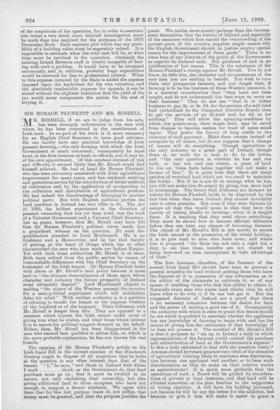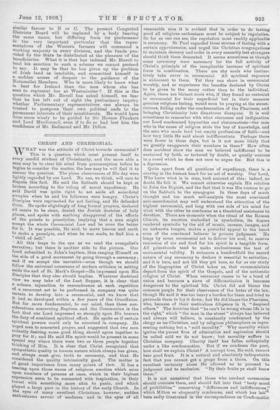SIR HORA.CE PLUNKETT AND MR. BIRRELL.
MR. BIRRELL, if we are to judge from his acts, has been strangely unfortunate in the men with whom he has been concerned in the resettlement of Irish land. In no part of his work is it more necessary for an English Chief Secretary to have good advisers. He can hardly have any practical knowledge of Irish peasant farming,—the only farming with which the Irish Government is much concerned ; consequently he must trust, in the first instance at least, to officials, not, it may be, of his own appointment. Of this constant element of risk and difficulty it seemed likely that Mr. Birrell would find himself relieved. He had at hand Sir Horace Plunkett, who has been intimately associated with Irish agricultural improvement for many years, and has rendered untiring and gratuitous service by the introduction of better methods of cultivation and by the application of co-operation to the collection and distribution of agricultural produce. He had indeed the disadvantage of belonging to another political party. But with English political parties the land question in Ireland has very little to do. The Act of 1903, the boldest experiment in the direction of peasant ownership thab has yet been tried, was the work of a Unionist Government and a Unionist Chief Secretary. Let us grant, however, that Mr. Birrell may have felt that Sir Horace Plunkett's political views made him a prejudiced witness on the question. No such dis- qualification attached to Lord Macdonnell. He is an Irishman and a Home-ruler, and he has that faculty of getting at the heart of things which has so often characterised the men who have made our Indian Empire. Yet with both these authorities Mr. Birrell is at issue. Both have retired from the public service by reason of irreconcilable differences with the Chief Secretary on the treatment of the Irish tenant. Sir Horace Plunkett looks with alarm at Mr. Birrell's land policy because it must lead to "the ultimate demoralisation of those upon whose character and industry the future prosperity of Ireland must ultimately depend." Lord Macdonnell objects to making "the misery of the Western peasant the occasion for a semi-political experiment which will indefinitely delay his relief." With neither authority is it a question of refusing to benefit the tenant at the expense whether of the landlord or of the taxpayer. Their difference with Mr. Birrell is deeper than this. They are opposed to a measure which injures the Irish tenant under cover of giving him what he wishes, and what those whose interest it is to secure his political support demand on his behalf. Either, then, Mr. Birrell has been disappointed in the men who seemed best qualified to advise him, or, which is the more probable explanation, he has not known his real friends.
The opening of Sir Horace P]unkett's article on the Irish Laud Bill in the current number of the. Nineteenth Centwry ought to dispose of all suspicions that be looks at the question in any other interest than that of the tenant. "I," he says, "and those in Ireland with whom I work think, as the Government do, that land purchase must go on ; that it must be twofold in its nature, not only abolishing dual ownership, but also giving additional land to those occupiers who have not enough to support a decent existence. We agree with them that for this last purpose loans do not suffice, that money must be granted, and that the purpose justifies the grant. We realise, more acutely perhaps than the Govern- ment themselves, that the history of Ireland, and especially of the measures which first caused the overcrowding of the poorest parts of the country, supplies ample reason why the English Government should in justice employ special means for the improvement of those parts." There, is no trace here of any distrust of the policy of the Government as regards its declared ends. But goodness of end is AO i justification of bad means. This s the substance of Sir Horace Plunkett's charge against Mr. Birrell. You do not know, he tells him, the character and circumstances of. the very men you are seeking to benefit. You wish to turn them into prosperous farmers and you forget that, if farming is to be the business of these Western peasants, it is a material consideration that "they have not been taught, and do not understand, the best ways to carry on their business." They do not see "that it is better business to pay 2s. or 2s. 6d. for the services of a. well-bred bull (subsidised by the Congested Districts Board) than to get the services of an ill-bred bull for 6d. or for nothing." They will allow the spraying-machines by which the potato-crop, their staple food, may be saved from disease to become .useless for want of some small repair. They prefer the luxury of long credit to the economy of cash payment. Make them owners instead of occupiers by all means, but do not suppose that a change of tenure will do everything. Though agriculture is the only industry in a great part of Ireland, though there is no work for a man to do in the towns, and "the only question is whether he has and can hold, or has not and can obtain, a piece of land to live on, these facts taken together will not make a farmer of him." It is quite true that there are many patches of wretched land which are too small to maintain the holder. But if lie is not fit to manage what he has, you will not make him fit simply by giving him more land. to mismanage. The theory that Irishmen are farmers by nature Sir Horace Plunkett holds to be disproved by the fact that when they leave Ireland they almost invariably take to other pursuits. But even if they were farmers by nature all that this would mean is that they have the faculty of taking kindly to farming—when it is taught them. It is teaching that they need above everything. They must be shown how to become efficient labourers before they can have any chance of becoming farmers. The object of Mr. Birrell's Bill is not merely to secure the Irish tenant in the possession of his actual holding ; it is to give land to men who have none ; and where this is proposed "the State has not only a right but a duty to see that these benefits are not wasted by being bestowed on men incompetent to take advantage of them."
The first business, therefore, of the framers of the newest Irish Land Bill should have been to prevent a general scramble for land without putting those who have the disposal of it in possession of any information as to the ability of the claimants to cultivate it, or of any means of enabling those who lack this ability to obtain it. Naturally every man who wants land thinks that he will know what to do with it if he can but get it. But the congested districts of Ireland are a proof that there is no necessary connexion between the desire for land and the power of making a good use of it. Consequently the authority with which it rests to grant this desire should be one which is qualified to ascertain whether the applicant has any knowledge of farming to begin with, and has the means of giving him the rudiments of that knowledge if lie does not possess it. The mischief of Mr. Birrell's Bill is that it proposes to "set up in Ireland a body in which representatives of the farmers would control the purchase and redistribution of laud. at the Government's expense." Is this a body calculated to deal with the question wisely ? Are men elected by voters ignorant very often of the elements of agricultural training likely to exercise a wise discrimina- tion between one applicant and another, or to base such discrimination as they do make on their relative merits as agrieulturists ? It is ,much more probable that the operations of such a Board will be guided by considera- tions of private or local interests, and that laud will be allotted somewhat on the plan familiar to the supporters of voting charities. A will have his holding increased, not because lie will be any the better for the addition, but because to give it him will make it easier to grant a
similar favour to B or C. The present Congested Districts Board will be replaced by a body bearing the same name, but differing from its predecessor in the very important particular that the repre- sentatives of the Western farmers will command a working majority in every division, and the funds pro- vided by the State be distributed at the pleasure of the beneficiaries. What it is that has induced Mr. Bissell to lend his sanction to such a scheme we cannot pretend to say. It may be that he has given up the problem of Irish land as insoluble, and committed himself in a sudden access of despair to the guidance of the Nationalist Members. Who is more likely to know what Is best for Ireland than the men whom she has sent to represent her at Westminster ? If this is the question which Mr. Bissell has asked himself, we fear that he has left out of sight the preliminary inquiry whether Parliamentary representatives can always be trusted to postpone their own political ends to the Permanent interests of their constituents. He would have done more wisely to be guided by Sir Horace Plunkett and Lord Macdonnell, even if to do so had lost him the confidence of Mr. Redmond and Mr. Dillon.











































 Previous page
Previous page